SAFEGUAR DSR TABLET
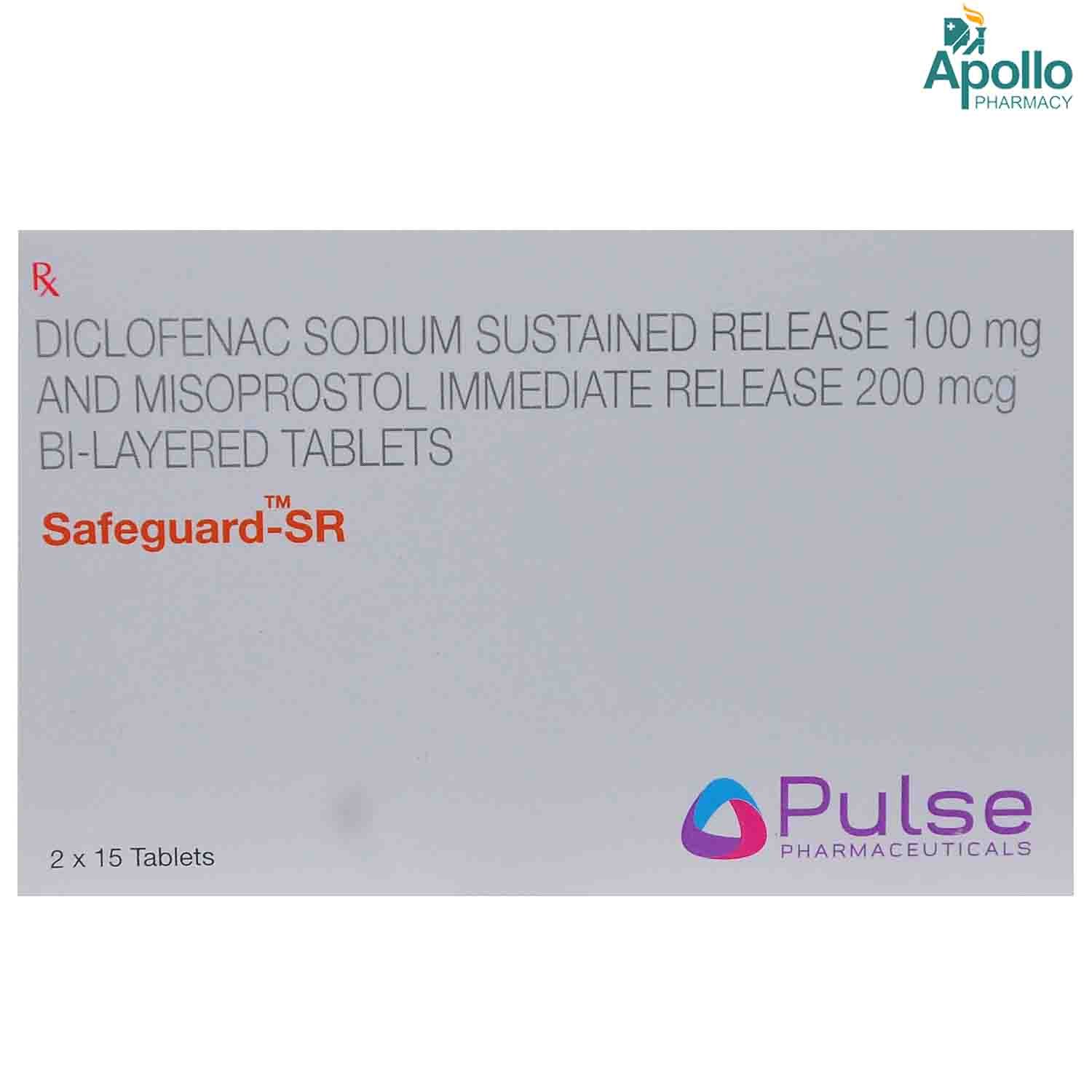
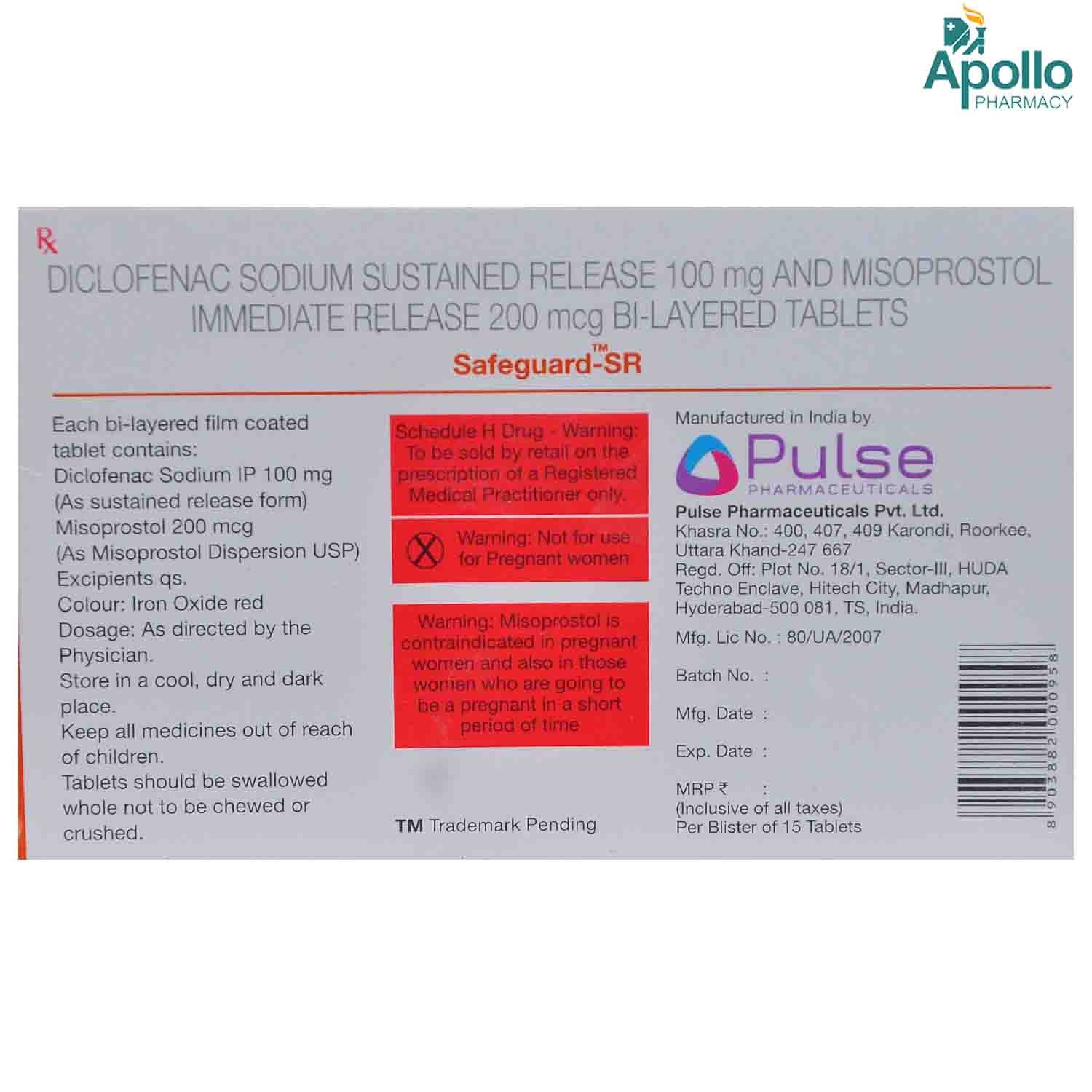
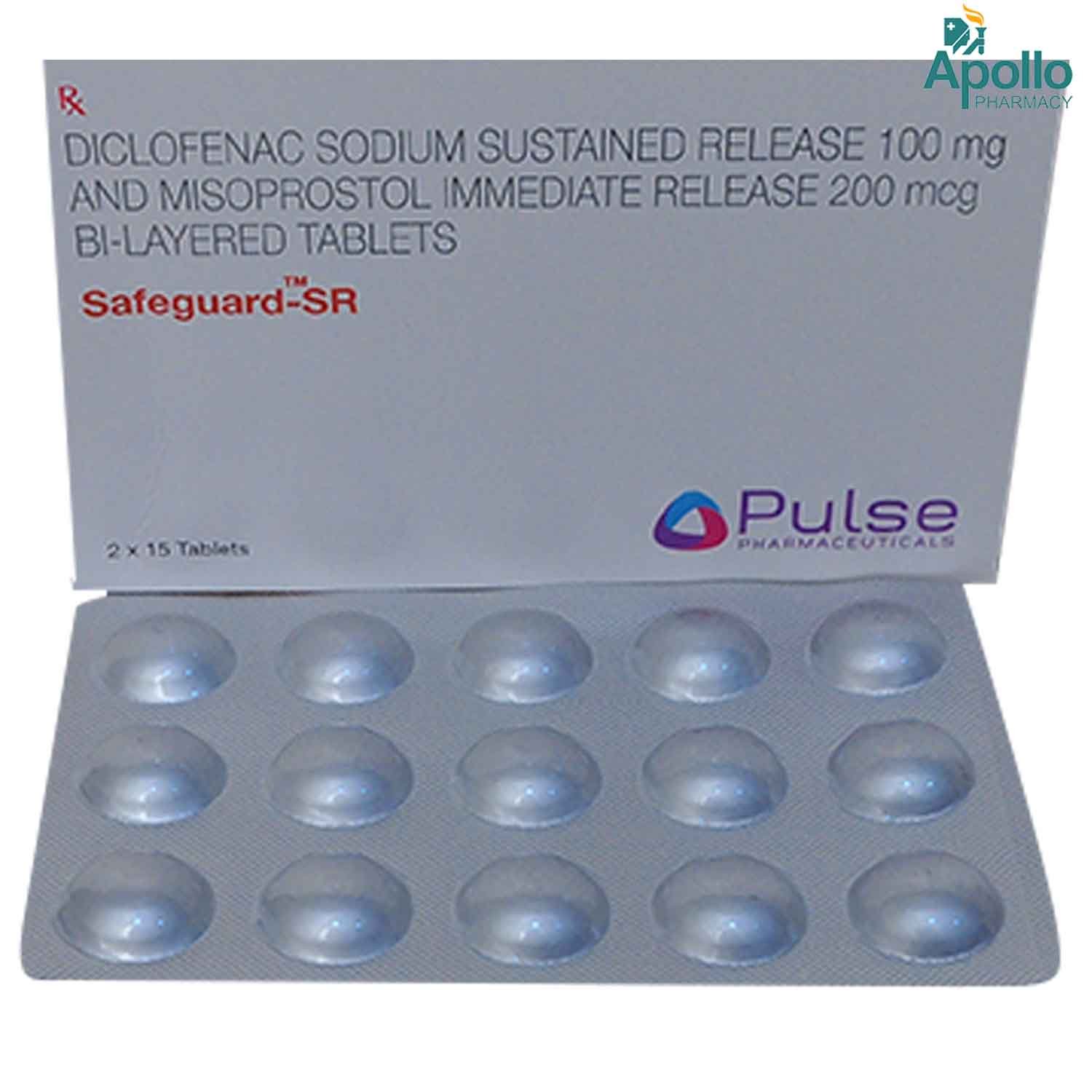
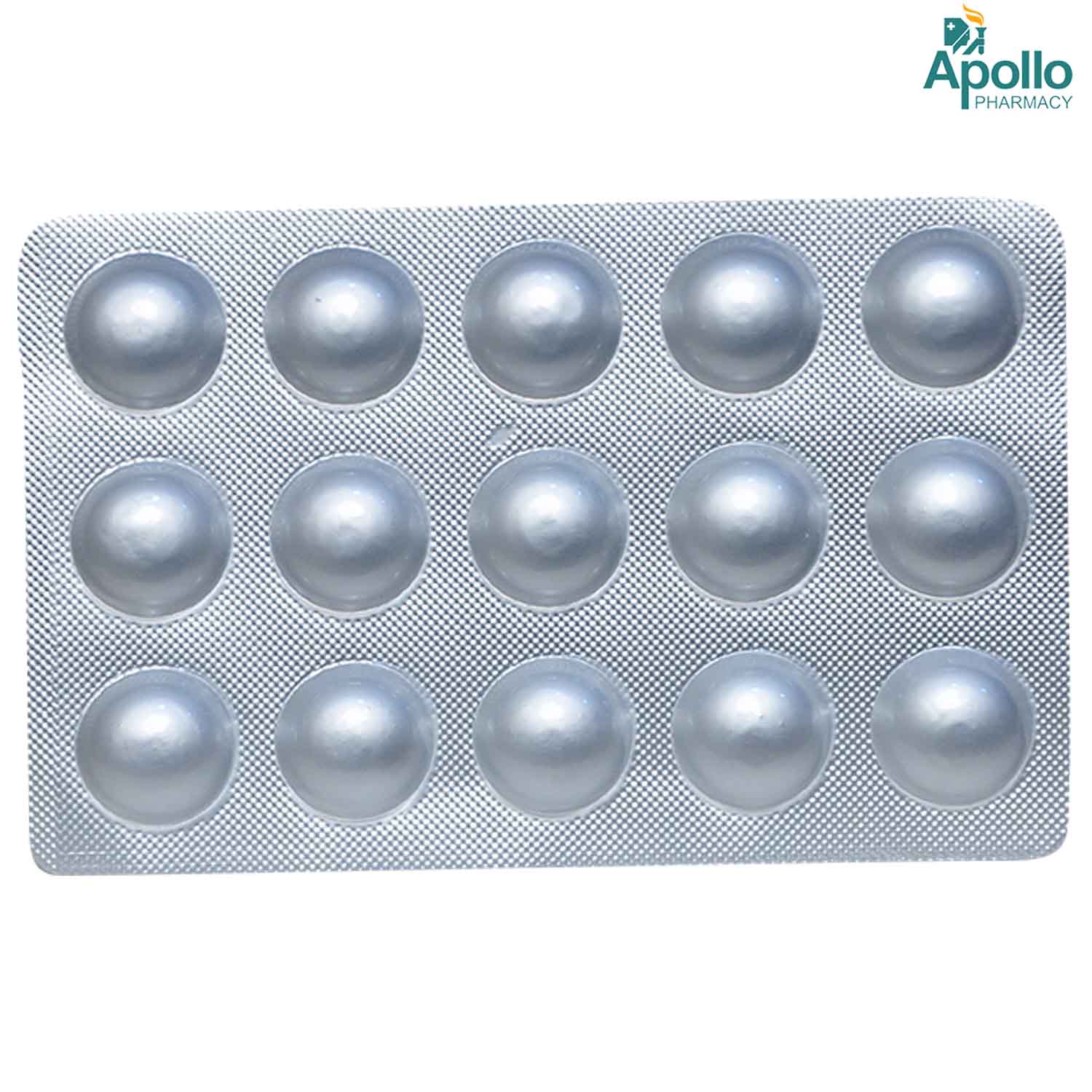
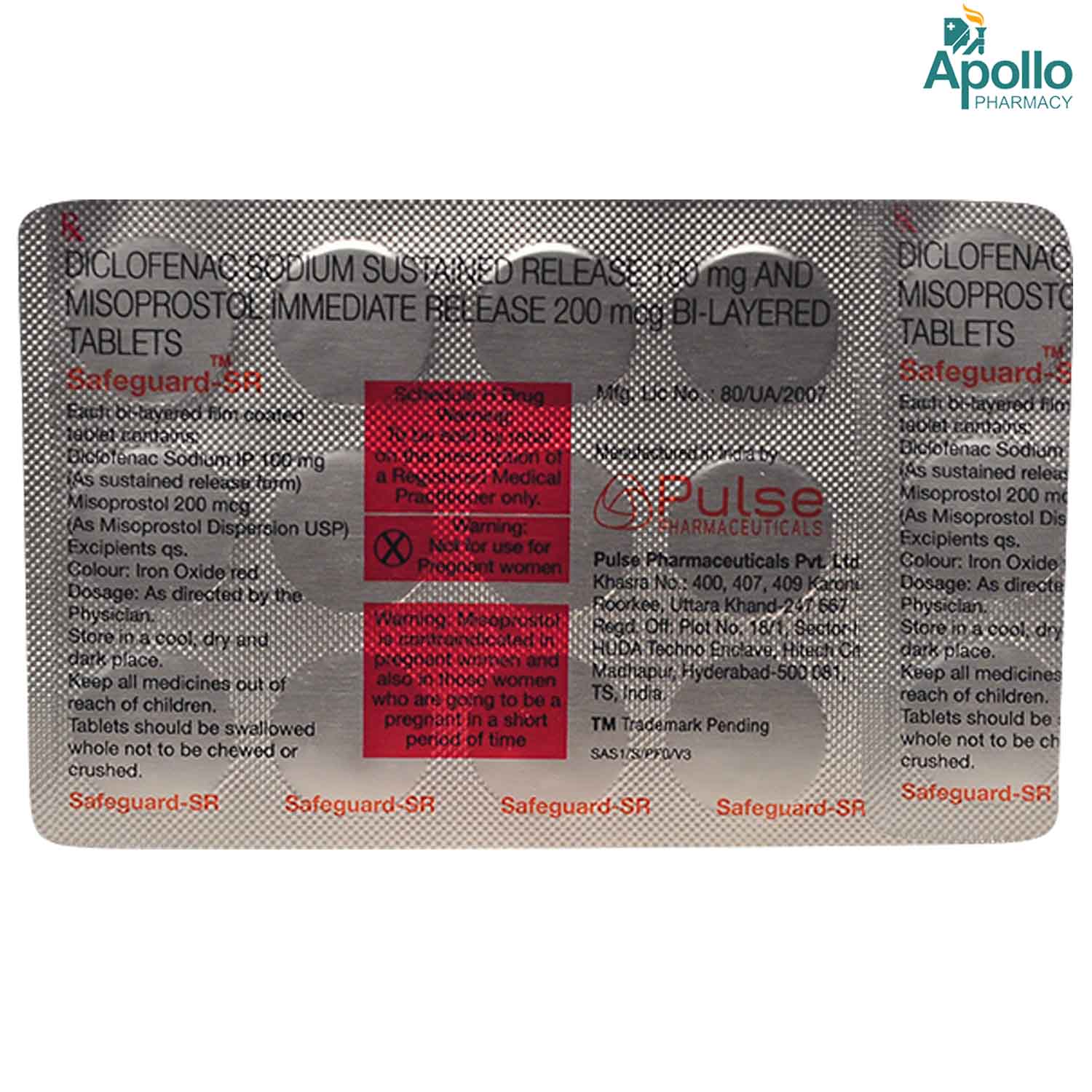





MRP ₹265.5
(Inclusive of all Taxes)
₹39.8 Cashback (15%)
Provide Delivery Location
Online payment accepted
 Prescription drug
Prescription drugWhats That
Composition :
Manufacturer/Marketer :
Consume Type :
Expires on or after :
Return Policy :
About SAFEGUAR DSR TABLET
SAFEGUAR DSR TABLET belongs to a class of non-steroidal anti-inflammatory drugs used to reduce pain and swelling in the joints associated with conditions such as osteoarthritis, rheumatoid arthritis, and ankylosing spondylitis (pain and stiffness in the backbone). Arthritis is a condition that causes swelling of one or more joints resulting in pain and stiffness of joints that worsen over time. The arthritis symptoms include joint pain, stiffness, redness, tenderness, swelling in and around joints, and reduced movement of joints.
SAFEGUAR DSR TABLET is a combination drug containing diclofenac and misoprostol. Diclofenac works by blocking the chemical effect of an enzyme called cyclo-oxygenase (COX), which produces prostaglandins (mediators of pain and inflammation) that are responsible for the sense of pain and inflammation (redness and swelling). Misoprostol is a prostaglandin that helps to protect the stomach from diclofenac's irritating effects. It works by protecting the stomach lining by reducing the amount of acid in contact with it.
Take SAFEGUAR DSR TABLET as prescribed by your doctor. Depending on your medical conditions, you are advised to take SAFEGUAR DSR TABLET for as long as your doctor has prescribed it for you. You may experience diarrhoea, stomach/abdominal pain, nausea, heartburn, drowsiness, and dizziness. Most of the side effects of SAFEGUAR DSR TABLET do not require medical attention and gradually resolve over time. However, if the side effects are persistent, reach out to your doctor.
Before using the SAFEGUAR DSR TABLET, tell your doctor if you have had a heart attack or stroke, stomach or bowel disorder, liver disease, porphyria ( inherited blood disorder), asthma, high blood pressure, diabetes, and stomach or intestinal bleeding. Do not take SAFEGUAR DSR TABLET if you are a pregnant or breastfeeding woman. Consumption of alcohol should be avoided during the treatment with SAFEGUAR DSR TABLET as it may lead to an increased risk of liver damage. SAFEGUAR DSR TABLET is not recommended for use in children. Limit alcoholic beverages while on this medication.
Uses of SAFEGUAR DSR TABLET
Directions for Use
Key Benefits
SAFEGUAR DSR TABLET is used to treat aches and pains and musculoskeletal and joint pain problems due to arthritis. SAFEGUAR DSR TABLET contains diclofenac and misoprostol. Diclofenac works by blocking the chemical effect of an enzyme called cyclo-oxygenase (COX), which produces prostaglandins (mediators of pain and inflammation) that are responsible for the sense of pain and inflammation (redness and swelling). Misoprostol is a prostaglandin that helps to protect the stomach from diclofenac's irritating effects. It works by protecting the stomach lining by reducing the amount of acid in contact with it.
Storage
Drug Warnings
Consumption of alcohol should be avoided during the treatment with SAFEGUAR DSR TABLET. Patients with stomach ulcers, gastric bleeding, heart failure, and high blood pressure should not take SAFEGUAR DSR TABLET. If pregnant or breastfeeding, do not take SAFEGUAR DSR TABLET without talking with the doctor. SAFEGUAR DSR TABLET is not recommended for children below 18 years old. Seek medical help immediately if you have signs of a heart attack or stroke. Stop using SAFEGUAR DSR TABLET and call your doctor immediately if you notice heart problems, kidney problems, liver problems, or stomach bleeding signs.
Drug-Drug Interactions
Drug-Drug Interactions
Login/Sign Up
Co-administration of Safeguar Dsr Tablet with Meloxicam can increase the risk or severity of gastrointestinal side effects.
How to manage the interaction:
Taking Meloxicam with Safeguar Dsr Tablet is not recommended as it can possibly result in an interaction, it can be taken if your doctor has advised it. However, consult your doctor immediately if you experience symptoms such as dizziness, lightheadedness, red or black, tarry stools, coughing up or vomiting fresh or dried blood that looks like coffee grounds, severe headache, and weakness. Do not stop any medication without doctor's advise.
Combined use of Safeguar Dsr Tablet and Dinoprostone can affect the metabolism of Safeguar Dsr Tablet.
How to manage the interaction:
Taking Safeguar Dsr Tablet and Dinoprostone together can possibly result in an interaction, it can be taken if your doctor has advised it. Do not discontinue any medications without consulting a doctor.
Coadministration of Safeguar Dsr Tablet and Oxytocin can enhance the action of oxytocin. This can increase the risk or severity of side effects.
How to manage the interaction:
Taking Safeguar Dsr Tablet and Oxytocin together can possibly result in an interaction, it can be taken if your doctor has advised it. However, if you experience sudden or severe stomach pain, unexplained vaginal bleeding, Fast heart rate or low blood pressure in the pregnant person, diarrhea, or dehydration, consult to a doctor. Do not discontinue any medications without consulting a doctor.
Taking Safeguar Dsr Tablet with Enoxaparin can increase the risk of bleeding complications.
How to manage the interaction:
There may be a possible interaction between Safeguar Dsr Tablet and Enoxaparin, but they can be taken together if your doctor has prescribed them. However, consult your doctor immediately if you experience any unusual bleeding or bruising, swelling, vomiting, blood in your urine or stools, headache, dizziness, or weakness. Do not discontinue any medications without consulting a doctor.
Coadministration of Safeguar Dsr Tablet with Ketoconazole may increase the risk of liver problems.
How to manage the interaction:
There may be a possible interaction between Safeguar Dsr Tablet and Ketoconazole, but they can be taken together if a doctor has prescribed them. However, consult a doctor immediately if you have fever, chills, joint pain or swelling, unusual bleeding or bruising, skin rash, itching, loss of appetite, fatigue, nausea, vomiting, abdominal pain, dark colored urine, light colored stools, and/or yellowing of the skin or eyes. Do not discontinue any medications without consulting a doctor.
Taking Safeguar Dsr Tablet with human immunoglobulin may increase the risk of kidney problems.
How to manage the interaction:
Although there is an interaction between Human immunoglobulin and Safeguar Dsr Tablet, you can take these medicines together if prescribed by a doctor. However, consult the doctor immediately if you experience symptoms such as nausea, vomiting, loss of appetite, increased or decreased urination, sudden weight gain or weight loss, fluid retention, swelling, shortness of breath, muscle cramps, tiredness, weakness, dizziness, confusion, and irregular heart rhythm. Do not discontinue any medications without consulting a doctor.
Taking Safeguar Dsr Tablet with Ibrutinib can increase the risk of bleeding tendencies.
How to manage the interaction:
There may be a possible interaction between Safeguar Dsr Tablet and Ibrutinib, but they can be taken together if a doctor has prescribed them. However, consult a doctor immediately if you experience any unusual bleeding, dizziness, lightheadedness, red or black, tarry stools, coughing up or vomiting fresh or dried blood that looks like coffee grounds, or severe headaches. Do not discontinue any medications without consulting a doctor.
Co-administration of Safeguar Dsr Tablet with Celecoxib may increase the risk of stomach bleeding and ulcers.
How to manage the interaction:
Although there is a interaction between Safeguar Dsr Tablet and Celecoxib, but it can be taken if your doctor has advised it. Consult a doctor if you experience symptoms like blood in your urine or stool (or a black stool), severe bruising, prolonged nosebleeds, feeling dizzy or lightheaded, weakness or severe headache, vomiting blood or coughing up blood, heavy menstrual bleeding (in women), difficulty breathing, or chest pain. Do not discontinue any medication without consulting a doctor.
Co administration of Safeguar Dsr Tablet with Leflunomide may result in liver problems.
How to manage the interaction:
Co-administration of Safeguar Dsr Tablet and Leflunomide can lead to an interaction; it can be taken if advised by your doctor. However, if you have a fever, chills, joint pain or swelling, unusual bleeding or bruising, skin rash, itching, loss of appetite, fatigue, nausea, vomiting, abdominal pain, dark-colored urine, light-colored stools, or yellowing of the skin or eyes. Do not stop using any medication without consulting your doctor.
Concomitant administration of Safeguar Dsr Tablet and furosemide may decrease the therapeutic efficacy of furosemide and adversely affect renal function.
How to manage the interaction:
There may be a possible interaction between Safeguar Dsr Tablet and furosemide, but they can be taken together if your doctor has prescribed them. However, consult your doctor immediately if you experience symptoms like nausea, dizziness, irregular heartbeats, altered blood pressure, tingling. Do not stop using any medications without first talking to your doctor.
Drug-Food Interactions
Drug-Food Interactions
Login/Sign Up
Diet & Lifestyle Advise
- Include more glucosamine, chondroitin sulfate, vitamin D, and calcium-enriched supplements. Besides this, turmeric and fish oils can help reduce inflammation in the tissue.
- Do not go for heavy exercise as it may increase your joint pain in arthritis. Instead, you can do stretching and low-impact aerobic exercises like walking on a treadmill, bike riding, and swimming. You can also strengthen your muscle strength by lifting light weights.
- In chronic arthritis or joint pain, try to include fish like salmon, trout, tuna, and sardines. These fishes are enriched with omega-3 fatty acids that minimize the level of cytokines, which ramp up inflammation.
- Your sitting posture is important, especially when you have pain and inflammation. Try to sit as little as possible and only for a short time (10-15 min). Use back support like a rolled-up towel to minimise pain at the back of your curve. Keep your knees and hips at a right angle. Besides this, you can use a footrest if required.
Side Effects of SAFEGUAR DSR TABLET
- Diarrhea
- Stomach/abdominal pain
- Nausea
- Heartburn
- Difficulty sleeping
- Ulcers in the stomach or intestines
- Drowsiness
- Dizziness
- Indigestion
Habit Forming
Therapeutic Class
All Substitutes & Brand Comparisons
Drug-Diseases Interactions
Drug-Diseases Interactions
Login/Sign Up
FAQs
SAFEGUAR DSR TABLET contains diclofenac and misoprostol. Diclofenac works by blocking the action of cyclo-oxygenase (COX) enzyme in the body involved in the production of certain chemical substances such as prostaglandins that cause pain and swelling. Misoprostol is a prostaglandin that helps to protect the stomach from diclofenac's irritating effects. Thereby, SAFEGUAR DSR TABLET helps in relieving pain and swelling associated with different types of arthritis.
No, SAFEGUAR DSR TABLET is not a narcotic pain killer. It belongs to the non-steroidal anti-inflammatory drugs (NSAIDs) group of medications.
Yes, SAFEGUAR DSR TABLET can cause dizziness in some patients. They may experience symptoms such as the feeling of fainting, weakness, or lightheadedness.
SAFEGUAR DSR TABLET may increase the risk of heart problems such as heart attack, especially when used in high doses or for a prolonged duration, and in patients who are smokers, have high blood pressure, diabetes, or high cholesterol. It is advised to inform your doctor if you have any of these conditions or have a history of heart problems or stroke before taking SAFEGUAR DSR TABLET. However, it is recommended to take SAFEGUAR DSR TABLET in the dose and for the duration as prescribed by your doctor.
SAFEGUAR DSR TABLET is not recommended for asthma patients as it may worsen the condition. Therefore, please inform your doctor if you have asthma or a history of asthma due to the use of aspirin or any other non-steroidal drugs.
No, SAFEGUAR DSR TABLET does not cure arthritis. SAFEGUAR DSR TABLET is only used to relieve symptoms of arthritis such as joint pain, swelling, and stiffness.
Drug-Drug Interactions Checker List
- ASPIRIN
- IBUPROFEN
- NAPROXEN
- CELECOXIB
- INDOMETHACIN
- MELOXICAM
- WARFARIN
- HYDROCHLOROTHIAZIDE
- LITHIUM
Special Advise
Disease/Condition Glossary
Osteoarthritis: Osteoarthritis is a degenerative joint disease in which the two ends of the joints come together due to the breakdown of a protective covering of cartilage. Due to the absence of this protective covering, the joints rub against each other, leading to pain and stiffness. Symptoms of osteoarthritis include pain, stiffness, inflammation, and tenderness. The main reason for osteoarthritis is age. The older you are, the more likely you could get osteoarthritis, thus known as degenerative disease, meaning that the joints wear out as a person ages. Other reasons include past injuries such as torn cartilage, dislocated joints, and ligaments.
Rheumatoid arthritis: Rheumatoid arthritis is an auto-immune disease (the body's immune system attacks its tissue), leading to joint pain and damage. Symptoms include pain, swelling, stiffness, deformities, and loss of joint function.
Ankylosing spondylitis: It causes pain and stiffness in the spine. The pain usually starts in the lower back and can spread to the neck, damaged joints, or other parts of the body. Ankylosing spondylitis includes decreased flexibility, which usually leads to hunched-forward posture, pain, and back and joints.

Have a query?
Buy best C.n.s Drugs products by
Intas Pharmaceuticals Ltd
Sun Pharmaceutical Industries Ltd
Torrent Pharmaceuticals Ltd
Alkem Laboratories Ltd
Abbott India Ltd
Cipla Ltd
Alteus Biogenics Pvt Ltd
Micro Labs Ltd
Lupin Ltd
Ipca Laboratories Ltd
D D Pharmaceuticals Pvt Ltd
Icon Life Sciences
Mankind Pharma Pvt Ltd
Tripada Healthcare Pvt Ltd
Arinna Lifesciences Ltd
Linux Laboratories Pvt Ltd
East West Pharma India Pvt Ltd
La Renon Healthcare Pvt Ltd
Talent India Pvt Ltd
Tas Med India Pvt Ltd
Zydus Healthcare Ltd
Cnx Health Care Pvt Ltd
Eris Life Sciences Ltd
Leeford Healthcare Ltd
Emcure Pharmaceuticals Ltd
Macleods Pharmaceuticals Ltd
Sigmund Promedica
Aristo Pharmaceuticals Pvt Ltd
Dr Reddy's Laboratories Ltd
Troikaa Pharmaceuticals Ltd
Consern Pharma Ltd
Zydus Cadila
Shine Pharmaceuticals Ltd
Wockhardt Ltd
Ardent Life Sciences Pvt Ltd
Crescent Formulations Pvt Ltd
Theo Pharma Pvt Ltd
Reliance Formulation Pvt Ltd
Ikon Pharmaceuticals Pvt Ltd
Propel Healthcare
Neon Laboratories Ltd
Jagsam Pharma
Msn Laboratories Pvt Ltd
Morepen Laboratories Ltd
Pulse Pharmaceuticals
Sanofi India Ltd
Med Manor Organics Pvt Ltd
Hetero Healthcare Pvt Ltd
Novartis India Ltd
Crescent Therapeutics Ltd
Elder Pharmaceuticals Ltd
Solvate Laboratories Pvt Ltd
Akumentis Healthcare Ltd
Mova Pharmaceutical Pvt Ltd
Psyco Remedies Ltd
Tripada Lifecare Pvt Ltd
Ajanta Pharma Ltd
Cyrus Remedies Pvt Ltd
Medishri Healthcare Pvt Ltd
Cadila Healthcare Ltd
Glenmark Pharmaceuticals Ltd
Matteo Health Care Pvt Ltd
Hbc Life Sciences Pvt Ltd
Lyf Healthcare
Matias Healthcare Pvt Ltd
Mesmer Pharmaceuticals
Alembic Pharmaceuticals Ltd
Capital Pharma
Crescent Pharmaceuticals
Medopharm Pvt Ltd
Alniche Life Sciences Pvt Ltd
Kivi Labs Ltd
Talin Remedies Pvt Ltd
USV Pvt Ltd
Quince Lifesciences Pvt Ltd
Solis Pharmaceuticals
Infivis Life Care
Zuventus Healthcare Ltd
Cadila Pharmaceuticals Ltd
Pfizer Ltd
Wallace Pharmaceuticals Pvt Ltd
A N Pharmacia Laboratories Pvt Ltd
Blue Cross Laboratories Pvt Ltd
Jenburkt Pharmaceuticals Ltd
Lia Life Sciences Pvt Ltd
Mano Pharma
Medley Pharmaceuticals Ltd
Primus Remedies Pvt Ltd
FDC Ltd
Maneesh Pharmaceuticals Ltd
Apex Laboratories Pvt Ltd
Gagnant Healthcare Pvt Ltd
Ozone Pharmaceuticals Ltd
RPG Life Sciences Ltd
Strides Shasun Ltd
Unichem International
GlaxoSmithKline Pharmaceuticals Ltd
Kuresys Labs Pvt Ltd
LA Pharma
Trion Pharma India Llp
Alcohol
Safe if prescribed
Do not consume alcohol along with SAFEGUAR DSR TABLET as it can cause unpleasant side-effects like gastric bleeding.
Pregnancy
Consult your doctor
Please consult your doctor if you are pregnant; your doctor will prescribe SAFEGUAR DSR TABLET only if the benefits outweigh the risks. Taking SAFEGUAR DSR TABLET in the last 20 weeks of pregnancy may cause serious kidney or heart problems in the unborn baby.
Breast Feeding
Consult your doctor
While SAFEGUAR DSR TABLET may pass in the lactating mother's breast milk, So, do it is advisable to take it only if prescribed by your doctor.
Driving
Safe if prescribed
SAFEGUAR DSR TABLET may cause dizziness and drowsiness. So, if you observe such symptoms, do not drive.
Liver
Consult your doctor
Limited information was available for the use of SAFEGUAR DSR TABLET in patients suffering from liver impairment. Please consult your doctor if you have any concerns regarding using SAFEGUAR DSR TABLET in patients with liver impairment. Your doctor will prescribe only if the benefits outweigh the risks.
Kidney
Consult your doctor
Limited information was available for the use of SAFEGUAR DSR TABLET in patients suffering from kidney impairment. Please consult your doctor if you have any concerns regarding using SAFEGUAR DSR TABLET in patients with kidney impairment. Your doctor will prescribe only if the benefits outweigh the risks.
Children
Safe if prescribed
SAFEGUAR DSR TABLET not recommended for children under 18 years of age.



